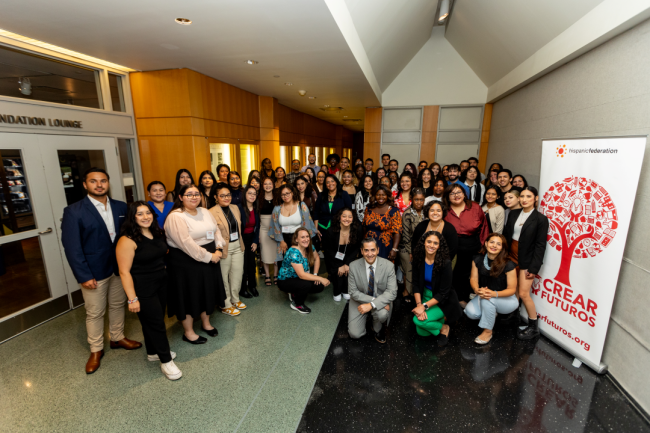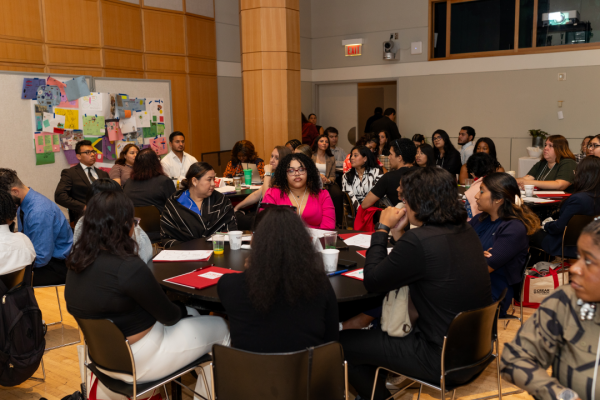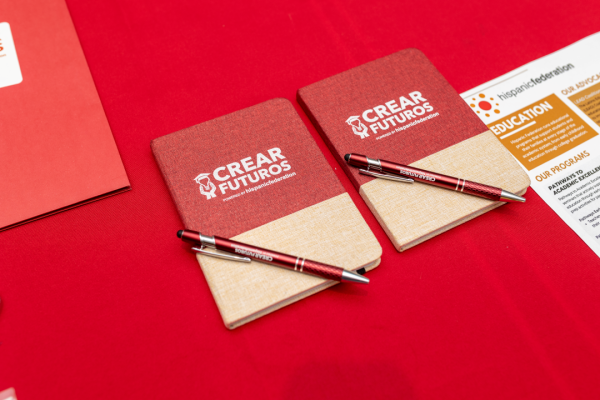You have /5 articles left.
Sign up for a free account or log in.

The 2023-24 cohort of CREAR Futuros mentors meet in New York for an annual training event the week of August 7.
Gabrielle Marrero
A long-standing peer mentorship and support program assists Hispanic and Latino college students in navigating college, building a network, developing leadership skills and overcoming barriers to degree completion.
The nonprofit Hispanic Federation launched CREAR Futuros in 2012, partnering with the City University of New York to supplement their on-campus resources and services for first-generation and Hispanic/Latino students.
The program offers paid leadership experience for mentors and one-on-one guidance and engagement opportunities for mentees, and connects all student participants to a larger Latino network.
Starting this fall, the program will expand to the University of Illinois at Chicago, North Carolina Central University, plus Purchase College and Old Westbury, State University of New York system institutions.
“Together, with our mentors and mentees, we’re investing in our students, creating networks of support, and reshaping their educational future,” says Frankie Miranda, president and CEO of Hispanic Federation.
Los antecedentes: The Hispanic Federation is a Latino nonprofit organization that unites around 600 smaller community-based organizations across 40 states and Puerto Rico, explains Jessica Guzmán Mejia, senior vice president of strategy and impact at the federation.
The federation offers financial support and training for community partners, participates in policy and advocacy work at the federal level, and creates community programming, like CREAR Futuros.
CREAR Futuros is short for College Readiness, Achievement and Retention, but also a Spanish phrase that meaning “creating futures.” The program offers peer mentorship for first- and second-year college students, leadership training, internship opportunities and connection to social services.
La necesidad: When the program was launched in the early 2010s, Hispanic and Latino students frequently stopped in the first year. Federation leaders wanted to promote persistence and retention among Hispanic and Latino students and promote success after graduation.
A July analysis by Excelencia in Education found Latino students’ degree-completion rates have stagnated in recent years, falling behind those of white students. At two-year institutions, 33 percent of Latinos graduated within three years and 52 percent of Latino students graduated from four-year institutions within six years.
A student survey from the nonprofit group YouthTruth also found 73 percent of Hispanic or Latino high school students want to go to college, but only 27 percent expect to attend a community college and 37 percent plan to attend a four-year college.
La mentoría: Each mentorship program is run a little differently by the institution, based on their cultural context, Guzmán Mejia says, but all engage in the same format and curriculum.
“Even within the [Latino] community, a New York City student is experiencing completely different things than what our Orlando students are facing, and so on and so on,” Guzmán Mejia says. “We bring in the perspective of, what are the sorts of social support services that they may need?”
HF has five goals for mentees within CREAR Futuros:
- To improve retention from semester-to-semester and year-to-year
- To improve grade point averages
- To improve credit accumulation
- To improve completion rates from two-year colleges and transfer rates to four-year colleges
- To improve rates of completion.
Mentors complete a three-day training to learn best mentorship practices, connect with peers and gain insight into leadership skills. This year’s training concluded the week of August 7, with around 60 mentors representing their respective institutions.
On campus, approximately four mentors work with 12 to 15 mentees apiece. Mentors commit to working at least 15 hours and receive a stipend for their involvement.

Mentors are trained to support students by guiding them, not taking steps for them, and connect them to community and institutional resources.
Gabrielle Marrero
Mentees, meanwhile, commit to participating for the entire academic year, attending biweekly meetings with their mentor as well as communicating on a weekly basis, participating in campus activities or groups, joining HF-lead event workshops and submitting feedback via an annual survey.
HF also provides financial investment into its partner institutions to support a staff liaison, programming costs and mentor stipends.
La diferencia: Formal and informal peer-mentorship programs exist across the country in a variety of forms for different identity and interest groups. CREAR Futuros is unique because it provides a culturally competent curriculum for mentors, addressing the unique needs of Latino students, and offers wraparound support from the Federation’s network.
For example, students who are undocumented or Deferred Action for Childhood Arrivals (DACA) can receive both mentorship support from their peers and assistance with DACA applications through the Federation, which includes associated costs.
Involvement in campus activities is the strongest contributor to a sense of community among Latino students, as well, according to research from Azusa Pacific University professor Laurie Schreiner.
While the program is targeted toward Hispanic and Latino students, all students at participating institutions can apply and participate, Guzmán Mejia says. Around 15 percent of past participants were not Hispanic or Latino.

CREAR Futuros is Spanish for "creating futures," and represents the impact of mentorship and guidance for a low-income or first-generation student.
Gabrielle Marrero
El impacto: Since launching, CREAR Futuros has supported around 7,000 students.
The Rutgers Education and Employment Research Center evaluated the program from 2015 to 2018 to measure persistence and completion among program participants. The study found CREAR Futuros participants at the City University of New York colleges retained at 10 percentage points higher, earned 20 more credits and graduated at a higher rate compared to their peers
“Our students are more engaged, our students stay in school, our students graduate,” Guzmán Mejia says.
Mentees, in addition to seeing mentors as helpful academic and personal role models, felt mentors impacted their personal growth, according to the report.
Seeking stories from campus leaders, faculty members and staff for our Student Success focus. Share here.




